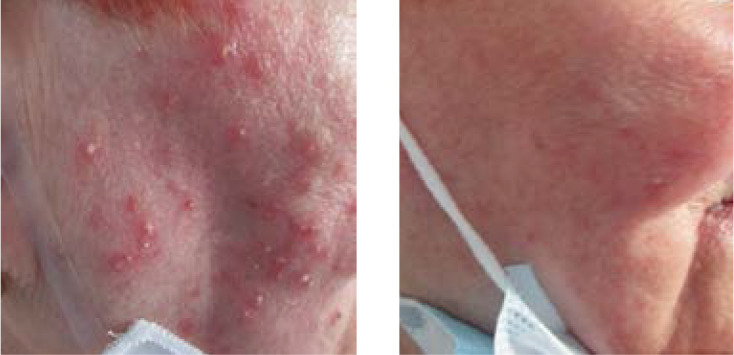Abstract
COVID-19 (SARS-COV-2) pandemic is associated with aggravation of facial dermatoses caused by professional prophylactic measures, mostly face masks, especially reported in healthcare workers, such as irritant and contact dermatitis, seborrheic dermatitis, rosacea, acne.
We present a case of flare-up of rosacea in a nurse working in an Intensive Care Unit for COVID-19 patients, using FFP1 type mask at work and textile or paper mask outside the hospital.
Keywords:COVID-19, SARS-COV-2, face mask, rosacea.
INTRODUCTION
Masks (medical masks, respirators like N95 and cloth masks) are mandatory for healthcare workers in order to prevent spread of infectious droplets in between persons by cough or sneeze. Wearing a mask for hours could cause exacerbation of rosacea, a skin disorder recently reported in nurses working in COVID Units (1).
CASE REPORT
A 56-year old female patient, working as nurse in an Intensive Care Unit (ICU) for COVID-19 patients, was examined for pruritus, erythema and small pustules spread on the face within the “face mask area” (Figure 1). Her past medical history was unremarkable, she was not taking any medication and denied any allergic background. Since March 2020, she has been wearing a FFP1 type mask at work and a textile or paper mask outside the hospital.
She was initially treated with oral antihistamines and short cure of moderate topical steroids of a presumed diagnosis of allergic contact dermatitis, but with aggravation of lesions and pruritus. Patch tests with European standard battery and textile series, formaldehyde and thiuram were negative, excluding the diagnosis of allergic contact dermatitis. The absence of response to topical steroids, systemic antihistamines and emollients were clues for a differential diagnosis of irritant contact dermatitis.
Based on clinical grounds, a diagnosis of papulopustular rosacea was suspected, aggravated by prolonged use of facial masks.
Bacteriological and mycological examinations were negative, and Demodex was not found on repeated examinations, probably due to intensive wash of the face with abrasive soap and application of emollients.
Although the diagnosis was easy, we encountered two major problems: to treat the patient and to convince colleagues from ICU that facial pustules were not putting hospitalized patients at risk.
The fact that any type of local treatment proved to be irritant and with no benefits for the patient could be also due to prolonged use of facial mask. Cleansers, azelaic acid cream, 1% ivermectin cream, even when associated to emollients, induced irritant contact dermatitis and a high level of anxiety to the patient. Systemic therapy was second choice, an algorithm based on metronidazole 1 g/day twice a day for two weeks and pimecrolimus cream administered one hour after removal of the face mask and no emollients. A slight improvement was obtained after two weeks of treatment. Pustules disappeared and the nurse could continue her job, despite persistent contact dermatitis and erythematous rosacea.
DISCUSSION
COVID-19 (SARS-COV-2) pandemic is associated, besides other skin diseases, with facial dermatoses caused by professional prophylactic measures (mostly face masks), especially reported in healthcare workers, such as irritant and contact dermatitis, seborrheic dermatitis, rosacea, acne (2). Prolonged use of facial masks causes a humid and warm environment that triggers facial skin diseases.
Flare-up of rosacea in healthcare providers working with personal protective equipment (PPE) has been reported and has raised the question of prophylactic and therapeutic measures, since abandoning the use of PPE was not an option (3). Moreover, pruritus can cause scratch and skin damage, with the risk of removing the mask, even for a short period of time, reducing the role of PPE in preventing COVID-19 contagion. This risk urges the correct diagnosis and rapid and precise treatment, adapted to persistence of occlusion induced by PPE. Initially, rosacea treatment can aggravate the symptoms, especially pruritus, so daily skin care is essential and should be individualized. Medical treatment should be associated to daily application of moisturizers, before and after face mask removal.
CONCLUSONS
The present case highlights the idea of an occupational rosacea due to protective measures during COVID-19 pandemic, which may be job threatening because its peculiar clinical features (pustular rosacea).
Conflict of interests: none declared
Financial support: none declared.
Acknowledgement: All authors have equal contributions in the present paper.
Patient informed consent: obtained.
FIGURE 1.
Papulopustular rosacea within the “face-mask area”, before and after tratament
Contributor Information
Anca E. CHIRIAC, Department of Epidemiology, “Grigore T. Popa” University of Medicine and Pharmacy Iasi, Romania
Uwe WOLLINA, Department of Dermatology and Allergology, Städtisches Klinikum Dresden, Germany.
Doina AZOICAI, Department of Epidemiology, “Grigore T. Popa” University of Medicine and Pharmacy Iasi, Romania.
References
- 1.Chen Y, Pradhan S, Xue S. What are we doing in the dermatology outpatient department amidst the raging of the 2019 novel coronavirus? J Am Acad Dermatol. 2020;4:1034. doi: 10.1016/j.jaad.2020.02.030. [DOI] [PMC free article] [PubMed] [Google Scholar]
- 2.Singh M, Pawar M, Bothra A, et al. Personal protective equipment induced facial dermatoses in healthcare workers managing COVID‐19 cases. J Eur Acad Dermatol Venereol. 2020;34:e378–e380. doi: 10.1111/jdv.16628. [DOI] [PMC free article] [PubMed] [Google Scholar]
- 3.Giacalone S, Minuti A, Spigariolo CB, Passoni E, Nazzaro G. Facial dermatoses in the general population due to wearing of personal protective masks during the COVID-19 pandemic: first observations after lockdown. Clin Exp Dermatol. 2020. [DOI] [PMC free article] [PubMed]



